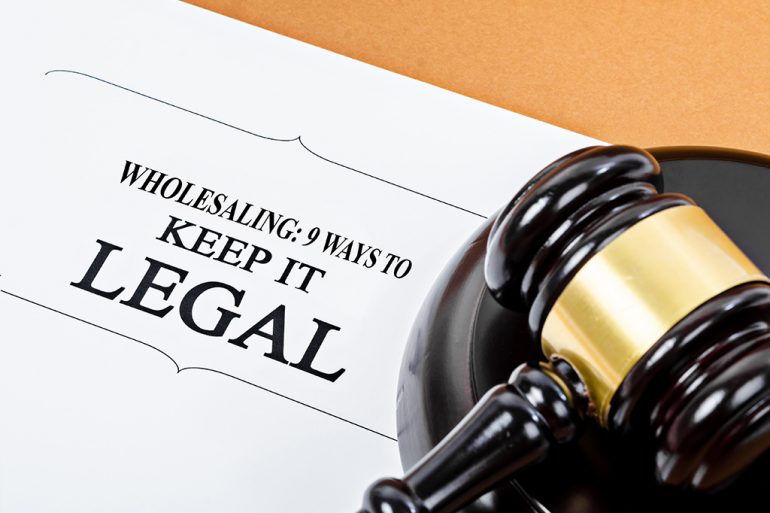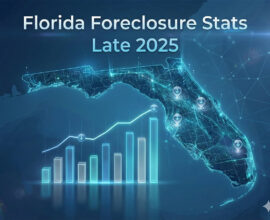9 Do’s and Don’ts to Wholesale LEGALLY in Florida
If I had a nickel for every time an investor said “I can’t wholesale in Florida because I’m not a licensed realtor!” I’d have a nice fishing boat by now. The truth is that you can absolutely wholesale legally in Florida without being an attorney, a licensed realtor, or a licensed broker.
However, investors can make serious mistakes when attempting to wholesale that may put their entire business strategy at risk. To wholesale legally in Florida, investors should, at a minimum, do and not do the following.
1. Don’t Enter Into a Wholesale Agreement Without Doing a Physical and Title Search on the Property
It’s essential to know what you’re getting into, have a realistic repair costs estimate, and be prepared to account for/pay off all liens attached to the property. You also do not want to make the mistake of entering into a contract with a person who does not have the legal right to sell the property. Related: $45 Title Searches
2. Don’t Enter Into a Wholesale Agreement Without Having the Right Paperwork in Place
You need to be familiar with and have sale/purchase contracts, assignments of contract, disclosures, service agreements, and third-party agreements. Wholesalers who jump the gun and rush to draft assignments, purchase contracts, and all other disclosures after finding a willing seller can and will make costly mistakes.
Real property deals must be in writing, so every contract needs to include a legal description that properly identifies the property and the names of the sellers and buyers. The document must be signed and dated by both sellers and buyers, with a clear and identifiable closing date.
Assignments should include the same information and clearly state whether the end buyer is assuming all of the legal obligations of the wholesaler and releasing the wholesaler of personal liability.
Wholesaling is a business, so you need to treat it like one and have all of your documentation in place.
3. Don’t Enter Into a Wholesale Agreement Without Having an End Buyer in Place
Finding a seller and then finding an end buyer is asking for failure. The profitability in these investment strategies is based on closing FAST for desperate sellers. A successful wholesaler already has an end buyer in place when they enter into a sales agreement and will almost never get stuck buying the property.
While it is not illegal to enter into a contract to purchase property under a price you cannot pay for in cash terms, it will open you up to a lawsuit for misrepresentation/fraud from the seller if you refuse to close because you lack the funds, on top of a breach of contract suit.
4. Do Pay an Earnest Money Deposit
ALL contracts require an offer, acceptance, and consideration to be valid. The earnest money deposit is the consideration. Earnest money deposits need to be sufficiently valuable to seal the deal (i.e., to induce a seller to sell you the property and not to offer it to another). A valuable earnest money deposit is usually 1% of the contract price, but generally no less than $500.
An agreement can be voided for lack of consideration. Nominal deposits of $100 lack the required value to secure real property deals. If you have not put down a deposit, then you do not have a valid contract that you can assign. You’ve opened yourself up to a lawsuit for misrepresentation/fraud from both the seller and the end buyer.
5. Don’t Market a Property You’re Under Contract With as If You Were the Seller
This is where wholesalers get into trouble violating Chapter 475 of the Florida Statutes. If you are not the seller or a duly contracted agent for the seller, you should not be putting up For Sale signs, listing the property for sale, offering the property to others, etc. A buyer under contract acquires equitable title to the property. Equitable rights provide access and financial interest in the property (such as natural appreciation of the property), but only legal title allows an investor to sell the property.
Wholesalers found to be marketing property for which they do not have legal title or a written representation agreement with the seller can get in trouble with the Florida Real Estate Commission, the Department of Business and Professional Regulation, and the district attorney’s office.
Civil penalties for unlawfully marketing property include $5,000 per violation, injunctions prohibiting the wholesaler from doing business, and a loss of professional license for realtors. Criminal violations of Chapter 475 of the Florida Statutes can subject a wholesaler to a third-degree felony conviction and a term of imprisonment up to five years.
6. Do Market the Rights to the Contract
Wholesalers MUST understand that they acquire personal rights to a contract when they sign a sale/purchase agreement. When talking to end buyers, wholesalers should focus on the sales price of their assignment of contract or the flat markup in a double closing, not the acquisition price of the property.
Even licensed realtors, brokers, and attorneys can violate Chapter 475 of the Florida Statutes if they market the property without having entered into an agreement to represent the seller in the transaction. It is a violation of Chapter 475 of the Florida Statutes to enter into a contract to purchase a house for $120,000, then market that property for $150,000 anywhere if you do not have:
- Legal title to the property first, or
- Are under a separate contractual arrangement as their attorney or realtor to market the property for that price
If you want to sell an assignment for $10,000, $20,000, etc. then you need to do just that. Market your contract rights and negotiate that price. Repeat after me: Legal wholesalers do not market the acquisition price of the property.
7. Do Comply With All Disclosure Requirements of a Double Closing
Title companies are title insurance agents. As such, they are required to comply with their title insurance underwriters’ disclosure requirements. In A to B then B to C closings, also known as double closings, underwriters require the title agent to disclose to A the source of B’s funds. This may require providing a copy of the B to C closing to seller A if B is relying on C’s funds for the closing.
Wholesalers who do not wish to disclose their markups to desperate sellers may choose assignments of contract instead of the double closing strategy.
8. Don’t Daisy Chain
If you are not the party to the sale purchase contract, then you do not have the right to market the assignment and much less the right to market the property. If you are the assignee of the contract, then you only have the exact same rights as the assignor, which means you cannot market the property for sale.
9. Do Comply With Florida’s Equity Investor Statutes (Fla. Stats. 697.08 and 501.1377)
Wholesalers are in the business of finding sellers who want out of their properties fast. It may be that the sellers have to move out of state ASAP. Perhaps the sellers do not want to manage the property they just inherited. The sellers could simply want to downsize and retire.
Thanks to the Great Recession and now the COVID-19 recession, desperate sellers often cannot afford to pay their mortgages and become delinquent. If your wholesaling business works with distressed sellers who are delinquent on their residential mortgages, it is absolutely essential that you disclose how you are going to pay off the outstanding delinquent mortgage and whether the seller will be allowed to repurchase the property from you (or the end buyer) or stay in the property for a time.
Anyone negotiating a payoff with the seller’s bank must have the following additional documents in place:
- A written Foreclosure Related Services Agreement
- A written Homeowner’s Right of Cancellation
- A written Cancellation Form
- A written Notice to Homeowner/Seller
These types of distressed property sellers have three days to rescind their contract and service agreements, and this right is non-waivable. Failure to abide by these requirements can result in $15,000 penalties per violation.
This means that, if you find a seller whose home will be sold in a mortgage foreclosure auction in two days and he agrees to sell you the house the next day, he can legally cancel the sale of the property to you after you have paid off the final judgment of foreclosure. And if you do not have the above written agreements and disclosures in place, you can incur costly civil penalties.
Don’t Be Afraid to Wholesale, But Do Your Research
Wholesaling legally has nothing to do with being a realtor and everything to do with being prepared. Still, if you’d like to donate a nickel to my fishing boat fund, I’ll graciously accept your donations. If you need help with setting up a proper LEGAL wholesaling business, or need legal help with a wholesale deal, my contact information is below.








